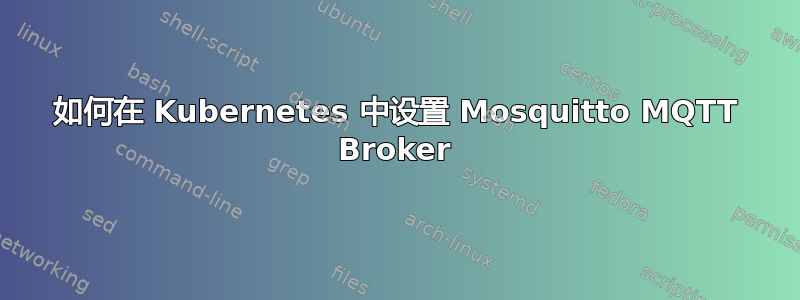
我一直在尝试在 Kubernetes 空间中设置 ChirpStack,但它似乎对我来说不起作用,而且我在网上找不到任何可以解决问题的资源。
**chirpstack-application-server-6d6f8d699c-nlrmx 1/1 Running 0 44s\
chirpstack-gateway-bridge-5454b7f9f-fm5wl 1/1 Running 0 73s\
chirpstack-mosquitto-646899d74d-d7bhl 0/1 CrashLoopBackOff 3 85s\
chirpstack-network-server-66cdf9bdf7-rhzg5 1/1 Running 0 55s**
以上是我现在拥有的每个 pod。应用服务器、网络服务器、网关桥接器都启动并运行,但是 Mosquitto 代理移动到“完成”并直接进入 CrashLoopBackOff。
我认为这可能与缺少配置有关,因此我花了几天时间将 mosquitto.conf 文件与“allow_anonymous true”放在一起,希望从我的任何 ChirpStack 组件获取连接,但日志仅指示 mqtt 连接被拒绝错误。
kubectl 日志 chirpstack-application-server 的输出
time="2020-12-10T15:01:41Z" level=error msg="integration/mqtt: connecting to broker error, will retry in 2s: Network Error : dial tcp 10.244.146.236:1883: i/o timeout"
因为无法建立连接,所以我假设情况正好相反,我需要添加 password_file 并将 allow_anonymous 设置为 false。下面是我当前的配置,如果有人知道哪里出了问题的话。
configMap-1.yml
kind: ConfigMap
metadata:
name: mosquitto-password
namespace: ****
labels:
app: chirpstack-mosquitto
data:
password_file.txt: |
admin:admin
user:user
app-server:app-server
net-server:net-server
gateway-bridge:gateway-bridge
配置地图.yml
kind: ConfigMap
metadata:
name: mosquitto-config
namespace: ****
labels:
app: chirpstack-mosquitto
data:
mosquitto.conf: |
persistence true
persistence_location /mosquitto/data/
# per_listener_settings false
log_dest stdout
# listener 1886
listener 1883
protocol mqtt
# Defaults to false, unless there are no listeners defined in the configuration
# file, in which case it is set to true, but connections are only allowed from
# the local machine.
allow_anonymous false
password_file /.config/mosquitto/auth/password_file.txt
# cafile: /mosquitto/config/certs/ca.crt
# certfile: /mosquitto/config/certs/server.crt
# keyfile: /mosquitto/config/certs/server.key
require_certificate false
use_identity_as_username false
部署.yml
kind: Deployment
metadata:
name: chirpstack-mosquitto
namespace: ****
spec:
replicas: 1
selector:
matchLabels:
app: chirpstack-mosquitto
template:
metadata:
labels:
app: chirpstack-mosquitto
spec:
containers:
- name: chirpstack-mosquitto
image: ****/chirpstack/eclipse-mosquitto:1.6.12
ports:
- containerPort: 1883
volumeMounts:
- name: password-file
mountPath: /.config/mosquitto/auth/password_file.txt
subPath: password_file.txt
- name: mosquitto-data
mountPath: /mosquitto/data
- name: mosquitto-log
mountPath: /mosquitto/log
- name: config-file
mountPath: /.config/mosquitto/mosquitto.conf
subPath: mosquitto.conf
securityContext:
runAsNonRoot: true
fsGroup: 1
runAsGroup: 1000
runAsUser: 1000
supplementalGroups:
- 1
volumes:
- name: config-file
configMap:
name: mosquitto-config
- name: password-file
configMap:
name: mosquitto-password
- name: mosquitto-data
emptyDir: {}
- name: mosquitto-log
emptyDir: {}
服务.yml
kind: Service
metadata:
name: chirpstack-mosquitto
namespace: 186215-poc
spec:
type: ClusterIP
ports:
- name: mqtt
port: 1883
targetPort: 1883
protocol: TCP
selector:
app: chirpstack-mosquitto
答案1
mosquitto/configmap.yaml:
apiVersion: v1
kind: ConfigMap
metadata:
name: mosquitto-config
data:
mosquitto.conf: |-
# Ip/hostname to listen to.
# If not given, will listen on all interfaces
#bind_address
# Port to use for the default listener.
port 1883
# Allow anonymous users to connect?
# If not, the password file should be created
allow_anonymous true
# The password file.
# Use the `mosquitto_passwd` utility.
# If TLS is not compiled, plaintext "username:password" lines bay be used
# password_file /mosquitto/config/passwd
mosquitto/deployment.yaml:
apiVersion: apps/v1
kind: Deployment
metadata:
name: mosquitto
spec:
selector:
matchLabels:
app: mosquitto
template:
metadata:
labels:
app: mosquitto
spec:
containers:
- name: mosquitto
image: eclipse-mosquitto:2.0
resources:
requests:
cpu: "50m"
limits:
memory: "128Mi"
cpu: "500m"
ports:
- containerPort: 1883
volumeMounts:
- name: mosquitto-config
mountPath: /mosquitto/config/mosquitto.conf
subPath: mosquitto.conf
volumes:
- name: mosquitto-config
configMap:
name: mosquitto-config
mosquitto/service.yaml:
apiVersion: v1
kind: Service
metadata:
name: mosquitto
spec:
selector:
app: mosquitto
ports:
- port: 1883
targetPort: 1883
现在:
$ kubectl apply -f mosquitto/
$ kubectl get pods,deployments,services -o wide
$ kubectl logs -l app=gateway-bridge -f --all-containers
答案2
按着这些次序:
调整值.yaml文件,添加节点端口或者负载均衡器并启用存储类。
service: type: NodePort persistence: storageClass: "oci-bv"通过部署掌舵图:
helm install mosquitto --generate-name查看蚊子pod 日志:
kubectl logs pod/mosquitto-service-name。例如:测试服务:
订户:
docker run -it --rm --name mqtt-subscriber efrecon/mqtt-client sub -h ip_address -p port -t "/#"发行商:
docker run -it --rm --name mqtt-publisher efrecon/mqtt-client pub -h ip- address -m "SOOntestMessage" -p port -t "/test"您应该在订阅者上收到消息:




